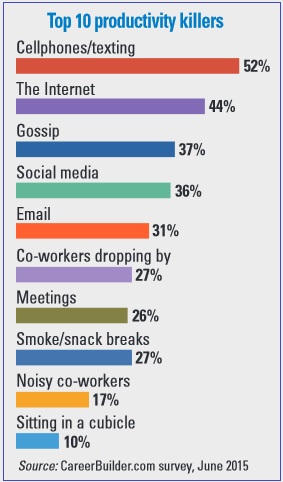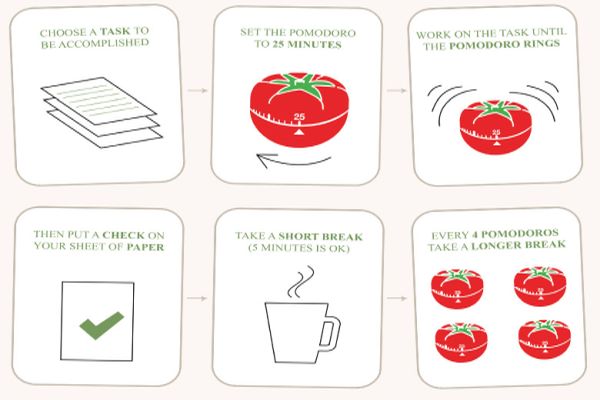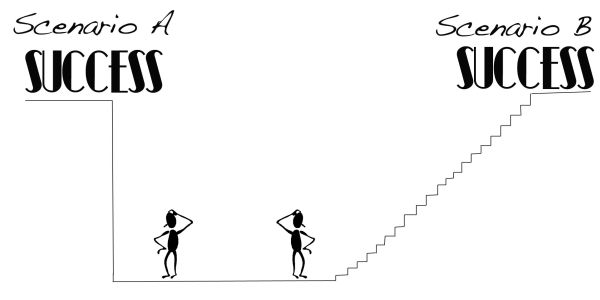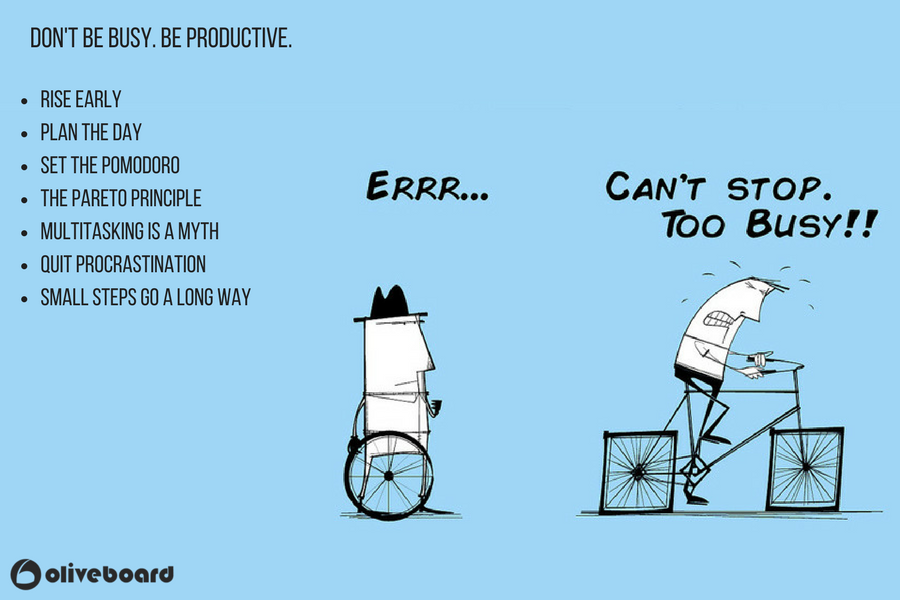Come rushing to the office just in time for that meeting after which you have plenty of new tasks to address. As you are going back to your desk, you feel like relaxing a little and so, you log in to Facebook for ‘5 minutes’. These five minutes turn into hours, and in some cases, an entire day.
In a nutshell, we end up spending most of our office hours ‘UN’productively.
What does this lead to?
- Work piling up
- Reduced performance
- A feeling that: ‘I am not liking the job’. Or,
- A feeling that: ‘I am not good enough for the job’.
As professionals, we all have days when we fall into the traps of various distractions such as- Facebook, Whatsapp, Instagram, talking with co-workers etc. and end up whiling away those precious hours at work. According to various studies, some of the major distractions at work are:

Though the immediate effects of these may not be noticeable, they negatively impact the career in the long-term. While small breaks actually make a person work more efficiently, stretched periods of wasting time must be checked. Following are a few causes that make a person ‘un’productive:
- Procrastination
- Boredom
- Lack of Energy
- Trying to multitask
- Being in the ‘Gray Zone’. (wherein is person is neither fully working nor relaxing)
Productivity is critical to career advancement in the long run and also to a person’s success at work. This quality becomes all the more important when you are a probationary officer in a bank or working somewhere as an intern and want a PPO from that organization, as it decides how far you’ll go. Thus, to help you excel at your workplace, we have compiled a list of the most effective ways to be productive at work.
1. Start the day right: Wake up early

It is the one thing that is common between all successful people. People often wonder how waking up early will make them more productive, well, here’s the answer: It provides time one needs to start the day right. Instead of feeling rushed each morning, one gets more quiet time to do things they would otherwise be too distracted to do. (Things like reading newspaper, eating a healthy breakfast, or exercising before starting the day.)
This keeps you in a relaxed and active state of mind, which in turn is very important for being productive, not just at work, but at anything you do.
2. Plan: Set a schedule for yourself
![]()
We all have heard the saying, ‘Failing to plan is planning to fail’. However cliched it sounds, it’s true.
One should plan their day at work preferably the day before or early morning. Identify the three (and no more) most important things you need to get done at work and strive to finish them in time. The tasks should be lined up as per priority. For this, answer the following questions:
- What needs your attention immediately?
- How much time do you need to accomplish a task? (Set achievable deadlines)
To-do lists are a great way of planning tasks. They help you track your progress and keep you motivated (striking a task off the to-do list is satisfying, to say the least).
Use your first few hours in the office as ‘crush time’. During this, just put your head down and finish off your hardest tasks.
There are days when a person feels overwhelmed with the amount of work and is tempted to walk away from it. Breaking down a major project into smaller, more manageable chunks is the key to avoiding such feelings. Scheduling these tasks helps you concentrate on one thing at a time, and before you know it, you’ve done everything you needed to do.
3. The Pomodoro Technique: Take regular breaks

This may seem counterintuitive to the idea of productivity but taking short breaks while working actually helps in replenishing focus and energy.
There is one famous technique, called the pomodoro, which is specially designed to increase focus during work. As per this method, you work for 25 minutes without any distractions, with full concentration and then reward yourself with a 5-minute break. This will help you increase your concentration spans in the long run. As you get comfortable, stretch the work time and stick to 5 minutes for the break.
You can be more productive if you step back for a little while from the task at hand. Take a short walk to the cooler for a drink of water, think about something else for a little while. When you go back to your task, it will be with fresh eyes and more focused attention.
4. The 80/20 Rule: Pareto principle

The Pareto Principle can be applied in all walks of life and this is what it says – 80% of the effects in situations are from 20% of the causes.
In reference to work, the rule essentially means cutting down on everything that is unimportant to get the energy to focus on things that actually add value. Answer the following questions and plan accordingly.
- In your current job, which are those 20% activities which give you 80% of your enjoyment? How can you increase them to further drive up your love for your work?
- How does your productivity fluctuate throughout the day?
- Which are those 20% situations when you are most productive?
- What occurs in those 20% situations that enable you to be productive?
- How can you replicate these so as to be more productive during other times as well?
5. Multitasking is a myth

According to studies, trying to accomplish more than one task at a time can significantly reduce productivity.
The act of doing does not always mean achieving. The human brain is not designed to focus on more than one task at a time. When it is forced to do so, the brain simply switches from one to the other as needed. And because there is a tiny lag every time you switch tasks, this can lead to mistakes and misses. It can also heighten your sense of stress and fatigue. You end up not getting anything done, or doing one or more things poorly.
Focus on one task at a time, complete it properly and move on to the next project.
6. Quit Procrastinating

To do this, first identify which kind of tasks do you procrastinate and notice why you do so. Make it a point to work on this ‘why’ daily. For instance:
- Someone who procrastinates going to work -> Because he/she feels they’re not good at it.
There could be multiple underlying causes of why they feel they’re not good enough. It could be a lack of knowledge, lack of confidence, lack of appreciation etc. These are the issues that need to be addressed on a daily basis.
More often than not, the cause of procrastination is ‘laziness’. For this, the 5-minute rule should be followed- anything that will take less than 5 minutes of your time should be done immediately. Do not put it off for a later time.
7. Small Steps Go a Long Way

- Keep your workplace organized and de-cluttered
- Minimize distractions: keep mobile phones on silent, log out of all social media accounts, turn off notifications etc.
- Keep yourself hydrated
- Avoid heavy meals as they lead to drowsiness. Instead take lighter and healthier meals that keep you fresh and energized
- Remember that all work and no play makes Jack a dull boy. Thus, work regularly but also take the time to recharge and rejuvenate yourself
We must learn to work more effectively and efficiently if we want to succeed. It’s never about just doing things, but doing things right. These top tips can help you on the path of productivity at work and help you experience higher levels of job satisfaction.
Do comment and let us know which techniques work the best for you.

The most comprehensive online preparation portal for MBA, Banking and Government exams. Explore a range of mock tests and study material at www.oliveboard.in
